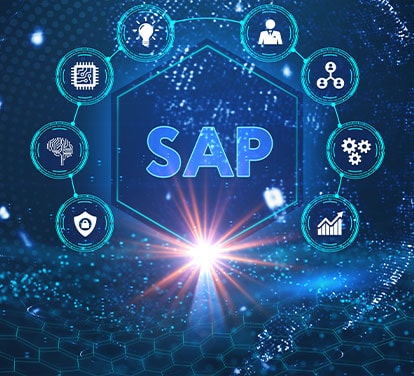In the current business dynamics, ‘Enterprise Integration’ plays a substantial role in the strategic choices of CIOs. The high demand for tailor-made integration services or applications is expected to propel the integration market at a CAGR of 6.6% and reach USD 665.5 billion by 2028.
There was a time when "Enterprise Integration" held little strategic significance for CIOs. Back then, a typical on-prem ERP system offered the necessary integration benefits by serving as a single tool for all business processes; in fact, integration was a key selling point for ERPs.
CIOs’ New Approach to Enterprise Integrations
Fast forward to the present, companies have migrated from on-prem installations to cloud software. The software as a service (SaaS) industry is thriving and in response leaders are shifting their strategies.
Rather than conforming to the best practices of a single provider (application), leaders are prioritizing their operational needs and accordingly exploring the smorgasbord of options. The global enterprise application market is burgeoning; it is expected to hit USD 480.75 billion** by 2032. As numerous specialized applications flood the market, organizations aim to choose the finest providers and seamlessly integrate their capabilities to achieve specific business goals. 83%*** of organizations consider enterprise integration as one of their top five business priorities.
As an enterprise integration services provider, Jade can help you develop and execute the ideal Integration Strategy. Continue reading for more insights on how to curate your integration strategy, the benefits you can expect, and how to calculate the actual value of your integration endeavors.
How to Develop a Comprehensive Integration Strategy: 7 Key Steps
An effective integration strategy is akin to a strategic roadmap that ensures an unhindered flow of data and streamlined operations, by tightly connecting everything in your IT landscape – including applications, clouds, data, APIs, processes, and device
1. Assess Your Needs
Identify the array of systems, applications, and data sources that necessitate integration. Moreover, pinpoint the precise goals integration is poised to achieve.
2. Choose the Right Tools
Integration tools come in diverse forms, each tailored to specific tasks. These tools include:
- Application and Data Connectors: These bridges facilitate smooth communication between different systems, ensuring data exchange without hiccups.
- Data Transformation Techniques: Data often comes in varied formats. These techniques ensure seamless data compatibility, making integration a breeze.
- Enterprise Service Bus (ESB): This acts as a central hub managing communication between applications and streamlining operations.
- APIs (Application Programming Interfaces): APIs allow different software applications to interact seamlessly, enhancing data sharing.
- Routing and Orchestration: These mechanisms control data flow, ensuring it reaches the right destination efficiently.
- Robotic Process Automation (RPA): Automation tools streamline repetitive tasks, reducing manual intervention.
- Custom Code: Tailored solutions involving custom code can meet unique integration requirements.
3. Prioritize Data Consistency
Establish a standardized description/understanding of critical data points, such as customers, employees, products, and inventory, across the entire company.
4. Defining Integration Patterns
Choose from options such as point-to-point integration, hub-and-spoke integration, event-driven integration, and batch integration, each serving specific integration needs.
5. Strategic Alignment
Align integration harmoniously with your overarching business goals, such as operation optimization, product launch acceleration, or elevation in data-driven insights.
6. Governance and Monitoring
Establish governance procedures, allocate responsibilities for overseeing integration processes, monitoring data flow, and resolving issues.
7. The Path of Continuous Enhancement
Regularly assess your strategy to adapt to evolving business needs and technological advancements.
Business Benefits of Enterprise Integration Services
System Integration services collectively contribute to organizational growth, agility, and competitive edge in the current dynamic business landscape.
- Enhanced Efficiency: It streamlines workflows, reduces duplication of tasks, and automates processes, leading to increased operational efficiency.
- Real-time Data Access: Integration enables real-time data sharing across systems, empowering timely and informed decision-making.
- Improved Customer Experience: Seamless data integration services ensure consistent customer interactions across touchpoints.
- Agile Adaptation: Integrated systems offer flexibility to adapt swiftly to market changes, seize opportunities, and stay ahead of competitors.
- Cost Savings: Automation and efficient data flow reduce manual efforts, minimizing errors and lowering operational costs.
- Informed Decision-Making: Integrated data from various sources provides comprehensive insights, enabling data-driven strategic choices.
- Accelerated Innovation: Cloud integration services enable easy adoption of emerging technologies like IoT and AI.
- Reduced Time-to-Market: Efficient integration expedites product launches and process improvements, facilitating quicker market entry.
- Compliance and Security: Centralized integration can enhance data security and ensure compliance with industry regulations.
How to Calculate the True Value of Integration Services
As you move your company into the future with newer tools, intelligent process automation, and advanced analytics, your emphasis on System Integration has shifted from a growth opportunity to an operational cornerstone. With that, the pursuit of greater value has come to the forefront. Your goal is not just about seamless connectivity; it's about quantifying the tangible impact on various aspects of your business. So, here is a checklist to measure the true value derived from your system integration endeavors.
- Cost Savings: Calculate the reduction in manual data entry hours and the associated labor costs. Also, consider the savings from avoiding errors and inefficiencies resulting from disconnected systems.
- Revenue Growth: Analyze how enterprise integration services contribute to revenue growth through improved customer satisfaction, targeted marketing, and enhanced cross-selling and upselling opportunities.
- Time-to-Market: Measure how integration expedites product launches and process improvements, allowing your business to seize market opportunities promptly.
- Innovation Impact: Quantify the benefits derived from adopting emerging technologies made possible by system integration services, such as increased operational efficiency from AI-driven analytics.
- Competitive Advantage: Assess the strategic advantage gained by the ability to respond rapidly to market changes and deliver superior customer experience.
- Customer Retention: Consider the impact of seamless experiences on your customer retention rates, leading to a steady revenue stream.
Endnote Move Ahead with Jade’s System Integration Services
At Jade, we understand the complexities of managing data in a multi-platform environment, and we offer our expertise in Enterprise Integration Services to help you build a well-integrated, frictionless IT infrastructure.
With a distinguished history of serving Fortune 500 companies, our expertise is fortified by our strategic alliances with industry giants such as Oracle, ServiceNow, NetSuite, and Salesforce. Our integration team specializes in leading integration platforms like Boomi and MuleSoft, crafting bespoke solutions that harmonize your applications flawlessly. Whether it's migration, assessment, or strategic implementation, we are here to help you harness integration not just as a solution but as a strategic advantage.













